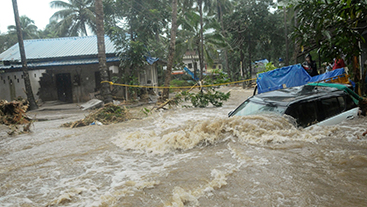The role of national laws in managing flood risk and increasing future flood resilience

Downloads
Flood risk is increasing across the world due to climate change and socioeconomic developments. With it, flood risk sciences and understanding of risks and drivers are advancing. However, the overall governance of flood risk remains a highly reactive process.
This paper explores the role of national laws in determining the nature of flood risk management (FRM) and in particular the ability to increase flood resilience in the context of climate change. There is still very little evidence on the role of national legislation in enabling or hindering decisions and actions to build flood adaptation and resilience. The paper seeks to address this knowledge gap.
The analysis shows that around the world law-making for flood risk is reactive and lacks consideration of future risks. Yet the predicted impacts of climate change call for ex-ante, pre-event and proactive policymaking and governance to be considered in the legislation-making of countries. The authors therefore call for a shift in FRM away from post-event activism towards forward-looking planning through an anticipatory resilience approach.
The authors explain that with a shift to anticipatory action being difficult for many reasons, laws could play an important role in facilitating this adjustment. For example, laws could require flood risk assessments to consider current and future risks and resilience levels, or set out how climate change trends need to be taken into account when making infrastructure or land-use decisions. The authors state that this is particularly important in the context of so-called slow-onset changes, such as sea-level rise and coastal erosion, which require decisions about pre-emptive resettlement or managed retreat that are likely to be politically difficult and unpopular.
Key points for decision-makers
- The authors analysed 139 laws from 33 flood-prone countries using evidence from the Grantham Research Institute’s Climate Change Laws of the World database and the IFRC’s Disaster Law database. They also utilised data from expert interviews and household surveys conducted via the Zurich Flood Resilience Alliance.
- The analysis shows that there has been a shift in flood laws away from an initial focus on flooding as a natural resource and water resource management issue towards a broader set of laws that consider flooding within disaster risk management (DRM) and climate adaptation policy.
- Yet the analysis finds a significant lack of detailed climate change recognition in laws regulating decisions and actions regarding future flood risks, especially in DRM laws. This is underpinned by an observed disconnection between flood/disaster-specific laws and climate change laws.
- The analysis finds a prevailing focus on post-event response and recovery strategies and a lack of recognition of risk reduction strategies and proactive flood risk governance approaches.
- The analysis also finds a large focus on the physical and human capital of flood resilience (e.g. early warning systems, large-scale defences) and less on natural capital and its role in increasing flood resilience. This requires more attention as natural flood risk management can offer many advantages over ‘hard’ engineered measures but this potential is often unrecognised or underfunded.
- Finally, the authors draw attention to the question of whether or how countries are implementing flood laws. The research finds that laws have rarely been implemented properly or equally across the countries investigated.

